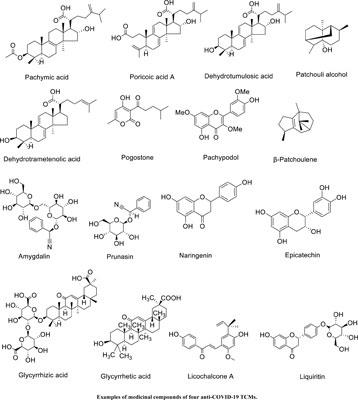当前位置:
X-MOL 学术
›
Curr. Drug Metab.
›
论文详情
Our official English website, www.x-mol.net, welcomes your feedback! (Note: you will need to create a separate account there.)
Impact of Drug Metabolism/Pharmacokinetics and its Relevance Considering Traditional Medicine-based Anti-COVID-19 Drug Research
Current Drug Metabolism ( IF 2.3 ) Pub Date : 2022-04-20 , DOI: 10.2174/1389200223666220418110133 Da-Cheng Hao 1, 2 , Fan Wang 1 , Pei-Gen Xiao 3
Current Drug Metabolism ( IF 2.3 ) Pub Date : 2022-04-20 , DOI: 10.2174/1389200223666220418110133 Da-Cheng Hao 1, 2 , Fan Wang 1 , Pei-Gen Xiao 3
Affiliation

|
Background: The representative anti-COVID-19 herbs, i.e., Poriacocos, Pogostemon, Prunus, and Glycyrrhiza plants, are commonly used in the prevention and treatment of COVID-19, a pandemic caused by SARSCoV- 2. Diverse medicinal compounds with favorable anti-COVID-19 activities are abundant in these plants, and their unique pharmacological/pharmacokinetic properties have been revealed. However, the current trends in drug metabolism/pharmacokinetic (DMPK) investigations of anti-COVID-19 herbs have not been systematically summarized. Methods: In this study, the latest awareness, as well as the perception gaps regarding DMPK attributes, in the anti- COVID-19 drug development and clinical usage was critically examined and discussed. Results: The extracts and compounds of P.cocos, Pogostemon, Prunus, and Glycyrrhiza plants show distinct and diverse absorption, distribution, metabolism, excretion, and toxicity (ADME/T) properties. The complicated herbherb interactions (HHIs) and herb-drug interactions (HDIs) of anti-COVID-19 Traditional Chinese Medicine (TCM) herb pair/formula dramatically influence the PK/pharmacodynamic (PD) performance of compounds thereof, which may inspire researchers to design innovative herbal/compound formulas for optimizing the therapeutic outcome of COVID-19 and related epidemic diseases. The ADME/T of some abundant compounds in anti-COVID-19 plants have been elucidated, but DMPK studies should be extended to more compounds of different medicinal parts, species, and formulations and would be facilitated by various omics platforms and computational analyses. Conclusion: In the framework of pharmacology and pharmacophylogeny, the DMPK knowledge base would promote the translation of bench findings into the clinical practice of anti-COVID-19 and speed up the anti-COVID-19 drug discovery and development.
中文翻译:

药物代谢/药代动力学的影响及其与基于传统医学的抗 COVID-19 药物研究的相关性
背景:具有代表性的抗 COVID-19 草药,即茯苓、广藿香、李属和甘草植物,常用于预防和治疗由 SARSCoV-2 引起的大流行病 COVID-19。多种药用化合物具有良好的抗-这些植物中有丰富的 COVID-19 活性,并揭示了它们独特的药理/药代动力学特性。然而,抗 COVID-19 草药的药物代谢/药代动力学 (DMPK) 研究的当前趋势尚未得到系统总结。方法:在本研究中,严格审查和讨论了抗 COVID-19 药物开发和临床使用中的最新认识以及对 DMPK 属性的认识差距。结果:P.cocos、Pogostemon、Prunus 的提取物和化合物,和甘草植物表现出截然不同的吸收、分布、代谢、排泄和毒性 (ADME/T) 特性。抗 COVID-19 中药 (TCM) 草药对/配方的复杂草药相互作用 (HHIs) 和草药-药物相互作用 (HDIs) 显着影响其化合物的 PK/药效学 (PD) 性能,这可能激发研究人员设计创新的草药/化合物配方,以优化 COVID-19 和相关流行病的治疗效果。抗 COVID-19 植物中一些丰富化合物的 ADME/T 已经被阐明,但 DMPK 研究应该扩展到更多不同药用部位、物种和制剂的化合物,并且将通过各种组学平台和计算分析来促进。结论:
更新日期:2022-04-20
中文翻译:

药物代谢/药代动力学的影响及其与基于传统医学的抗 COVID-19 药物研究的相关性
背景:具有代表性的抗 COVID-19 草药,即茯苓、广藿香、李属和甘草植物,常用于预防和治疗由 SARSCoV-2 引起的大流行病 COVID-19。多种药用化合物具有良好的抗-这些植物中有丰富的 COVID-19 活性,并揭示了它们独特的药理/药代动力学特性。然而,抗 COVID-19 草药的药物代谢/药代动力学 (DMPK) 研究的当前趋势尚未得到系统总结。方法:在本研究中,严格审查和讨论了抗 COVID-19 药物开发和临床使用中的最新认识以及对 DMPK 属性的认识差距。结果:P.cocos、Pogostemon、Prunus 的提取物和化合物,和甘草植物表现出截然不同的吸收、分布、代谢、排泄和毒性 (ADME/T) 特性。抗 COVID-19 中药 (TCM) 草药对/配方的复杂草药相互作用 (HHIs) 和草药-药物相互作用 (HDIs) 显着影响其化合物的 PK/药效学 (PD) 性能,这可能激发研究人员设计创新的草药/化合物配方,以优化 COVID-19 和相关流行病的治疗效果。抗 COVID-19 植物中一些丰富化合物的 ADME/T 已经被阐明,但 DMPK 研究应该扩展到更多不同药用部位、物种和制剂的化合物,并且将通过各种组学平台和计算分析来促进。结论:



























 京公网安备 11010802027423号
京公网安备 11010802027423号